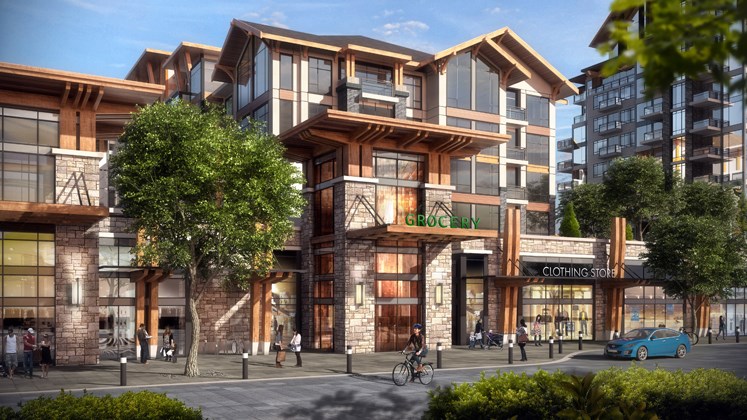District of North Vancouver council adopted a plan for future development in Lynn Valley town centre Monday night that allows for building heights of between eight and 12 storeys to be considered in key locations.
Council unanimously passed the plan that calls for most building heights to be limited to five storeys, but allows up to eight storeys on several “strategic” parcels, including land on the north side of East 27th Street between Lynn Valley Road and Mountain Highway and two blocks that abut the corner of Kirkstone Park.
Council will also consider buildings up to 12 storeys on a “case by case” basis.
The decision Monday night came after a long and emotional process, which has seen residents split on what kind of density and height they’d like to see in the centre of Lynn Valley.
Prior to the vote Monday, a number of residents spoke both for and against the plan for increased density.
Those speaking for the plan said density is needed to ensure a vibrant local economy.
“Most of the residents of Lynn Valley I’ve spoke to would like to see at least eight storeys or higher. Lynn Valley Mall is dying. The area needs to be revitalized,” said John Neumann.
Dana Rousseau echoed that, saying higher density will allow for more housing variety and view corridors.
Others disagreed. Alex Schwartz presented council with a petition with the names of more than 2,000 people opposed to heights over six storeys.
Chris Litchford and Dianne Bogue also spoke against the plan to allow buildings of more than five storeys.
“We don’t want to be like New York City,” said Bogue. “We want to keep the character of Lynn Valley the way it is now.”
According to a staff report that compared the options of limiting future development to five storeys and allowing higher density, the higher-density option would see about 2,100 additional housing units built in the town centre by 2030, while the lower-density option would mean about 1,450 units.
According to the report, the higher-density option would also mean between $16.3 and $19.8 million more revenue for the district in one-time payments — including community amenity contributions and development cost charges — than the low-density plan, plus $1.4 million more per year in ongoing revenue.
Coun. Alan Nixon said that is an important factor. “I can’t help but pay attention to the sizable dollars,” said Nixon.
Coun. Robin Hicks agreed. “It’ll have a positive impact on our bottom line and our tax rate,” he said.
Coun. Mike Little said the town centre plan was consistent with the district’s official community plan, which calls for development in Lynn Valley to be concentrated in the core of the community.
Several councillors said adoption of the plan does not mean automatic approval for buildings of 12 storeys. Projects must still go through a rezoning and public hearing process, said Nixon. “There will be lots more opportunities to come to council” before a shovel hits the ground, he said.
The staff report originally suggested allowing a maximum height of 16 storeys — the height of Kiwanis Lynn Manor.
Council voted to cap that at 12 storeys, at the suggestion of Coun. Lisa Muri.
Several councillors spoke about the lengthy process behind the plan and the divisions it has sparked within the community.
“I’m sure by selecting this route some of my friends won’t be my friends anymore,” said Hicks.
Mayor Richard Walton rejected accusations that the process behind the plan hasn’t been fair, saying there are always tradeoffs to consider.
The vote in favour of the town centre plan comes after Bosa Development Corporation recently unveiled a plan to build 379 condo units in seven buildings, including two 12-storey towers in the area.



